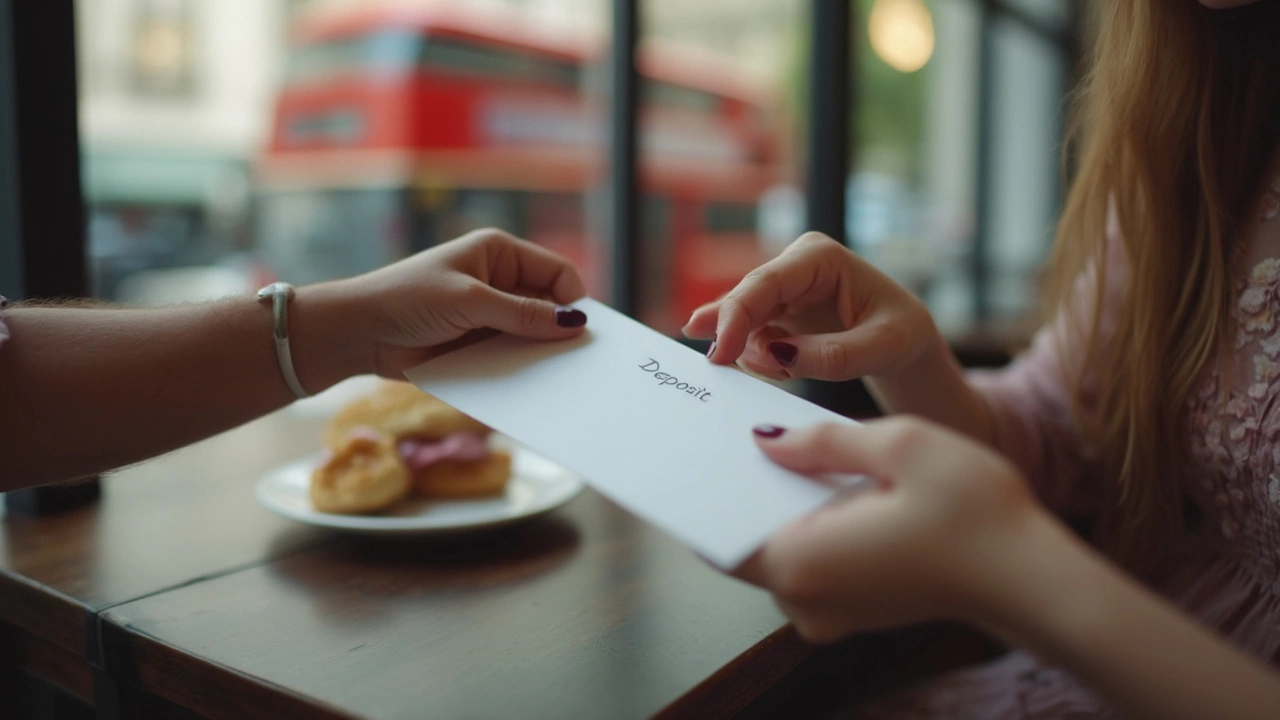The payment schedule for a wedding photographer is usually set in stone long before you cut the cake. Most photographers ask for a deposit (think 25% to 50% of the total fee) when you lock in your wedding date. Why? They don’t want to risk blocking off their calendar then being left hanging. Plus, it gives you both skin in the game. Be ready for this—it’s not negotiable for most pros.
Usually, the rest of the payment is due either a week or two before the big day or on the day itself. Some photographers prefer everything settled before they show up to avoid distractions, while others are okay getting the balance once the job’s done. Always get these details in writing in your contract so nobody ends up stressed at the worst possible time (believe me, nothing kills the vibe like chasing money when you should be dancing).
- Why Payment Timing Matters
- The Typical Payment Timeline
- What to Watch for in the Contract
- Red Flags and Handy Tips
Why Payment Timing Matters
Getting the wedding photographer payment right isn’t just about money changing hands. It sets the tone for trust and keeps expectations clear for both sides. When you pay as outlined in your contract, you’re showing the photographer you’re serious about their work—and that’s a big deal when they’re setting aside an entire day (sometimes even more) just for you.
Your deposit is a safety net for the photographer. If your plans suddenly change, that deposit covers the time they blocked off for you, which they cannot easily rebook. Most photographers book up months—sometimes over a year—in advance, so skipping out on this policy would be a recipe for lost income and headaches.
- Advance payments help the photographer plan: they pay for gear, assistants, and travel early on.
- Clear timelines mean fewer last-minute problems. No one wants stress over money during wedding week.
- Photographers often edit for hours or days after your event. Getting paid on time covers all their work, not just the time at your wedding.
If you’re wondering how common deposits are, data says almost wedding photographer payment plans require 30%-50% upfront. Here’s a quick snapshot based on a survey from a popular wedding planning site in 2024:
| Deposit Percentage | Photographers Using This Option |
|---|---|
| 30% | 15% |
| 40% | 30% |
| 50% | 50% |
| Other | 5% |
Bottom line: nailing the payment timing keeps things smooth for everyone. It protects your date, protects the photographer’s time, and makes the whole process a lot less awkward. No one wants a money squabble to be the lasting memory from their wedding day.
The Typical Payment Timeline
If you're wondering exactly when to pay your wedding photographer, here's what usually happens in real life. Most pros stick to a tried-and-true timeline that works for everyone. This prevents last-minute drama and sets clear expectations.
Here’s what a standard payment timeline for wedding photographers looks like:
- Deposit: Expect to pay a deposit (or retainer) when you book. This is almost always due at contract signing and is usually between 25% and 50% of your total fee.
- Second payment (if there is one): Some photographers break it into three payments. The second is often halfway between booking and the wedding date.
- Final payment: This is usually due 1-2 weeks before the wedding, though some photographers are chill with payment on the wedding day itself. A few even allow payment after photos are delivered, but that's rare for seasoned pros.
Here's a side-by-side comparison of a typical payment plan:
| Milestone | When It’s Due | Typical Percentage |
|---|---|---|
| Deposit | At signing | 25–50% |
| Second Payment (if any) | Midway to event | 25–30% |
| Final Payment | 1–14 days before wedding | 20–50% |
Don’t be surprised if the contract says, “All fees must be paid in full before the event.” It’s a security thing—imagine if you didn’t pay up and the photographer never showed up. Awkward, right?
Quick tip: Always get a receipt or written confirmation for every payment. Digital payments (like Venmo, PayPal, or bank transfer) leave a clear trail. Cash payments can work but ask the photographer for a signed receipt on the spot.
Depending on who you hire, they may offer payment plans (especially handy if you’re budgeting every dollar). Don’t feel weird asking. Pros do this all the time, and it can make top-quality photography more affordable without stress.
Bottom line—sort out your wedding photographer payment details early. No one wants payment squabbles when you should be celebrating.

What to Watch for in the Contract
It's tempting to skim the contract and just focus on the price, but you really want to dig in before signing. The number one thing to check? The exact payment schedule for your wedding photographer payment. It should spell out how much is due up front (the deposit), when the next payment is needed, and the final payment date. If it's fuzzy or missing, ask for clear details—no one likes surprises with money.
Most legit wedding photographers stick to industry standards, but the details can vary. It's also smart to look for these in the contract:
- What's included for the price: Is it just the pictures, or do you also get albums or digital files? Double-check how many hours of coverage you're paying for, too.
- Cancellations and refunds: If something comes up (like the venue double-booking or—ugh—a global pandemic), know what happens to your deposit and the rest of the balance.
- Delivery time: How long after the wedding will you get your photos? The average is about 6 to 12 weeks. This should be on paper, not just a verbal promise.
- What happens if the photographer gets sick? There should be a backup plan or a substitute photographer listed.
- Overtime charges: Sometimes the reception runs late. Know what it'll cost if you need the photographer to stay an extra hour.
You might be surprised, but according to a 2024 survey by The Knot, couples who got burned with wedding vendor payments said the contract was too vague about timing or refunds more than 60% of the time. Specific details are gold.
Here's a quick look at what you'll usually see in wedding photographer contracts:
| Clause | Common Practice |
|---|---|
| Deposit Amount | 25-50% of total fee, non-refundable |
| Final Payment Due | 7-14 days before wedding (rarely after) |
| Cancellation Policy | Deposit lost, balance refunded if before final payment |
| Delivery Timeline | 6-12 weeks after wedding |
| Extra Hours | $200-$500/hour |
If anything is unclear, ask questions before money changes hands. When everyone knows what to expect, there’s a lot less stress on the big day.
Red Flags and Handy Tips
Let’s get real: paying a wedding photographer isn’t just about swapping cash and hoping for the best. Spotting trouble early saves a ton of headaches. If a photographer skips the contract talk or wants the full payment way too soon, think twice. Standard industry practice is a deposit upfront, then the rest just before or on the wedding day. Anyone who pressures you for 100% payment months ahead? That’s a red flag.
Another red flag? Sketchy payment methods. If they only take cash or ask you to send money through untraceable apps with no receipts, be wary. Legit photographers accept standard methods like bank transfer, credit card, or established online payment systems—and always provide an invoice or receipt.
Don’t just take their word for it—ask for references or check recent reviews. According to a survey by The Knot, couples who skimmed contracts or skipped review checks were twice as likely to complain later about payments or missed deadlines. If someone resists sharing their portfolio or gets cagey about past clients, that’s your cue to walk away.
| Red Flag | Why It’s a Problem |
|---|---|
| No written contract | You have no proof of agreement if things go wrong |
| Full payment demanded far in advance | Standard is deposit first, balance later |
| No clear payment method or receipt | Hard to track and prove payment issues |
| Refusal to share reviews or portfolio | Makes it hard to check their reputation |
| Vague about what’s included | You risk being charged unexpected fees or missing out on key services |
Keep your cool by following these quick tips:
- Always get the payment schedule and deliverables in writing.
- Don’t pay more than 50% upfront—never the whole amount unless it’s just before the wedding.
- Stick to safe payment methods and ask for a detailed receipt.
- Look up at least three recent reviews, not just the glowing testimonials on their site.
- If anything feels off, trust your gut and check with other couples or planners for recommendations.
Getting the money stuff sorted early means you’ll actually get to focus on, you know, the fun part—marrying your person. If you’re unsure, don’t be shy about asking even the "dumb" questions. You’ll thank yourself later.

